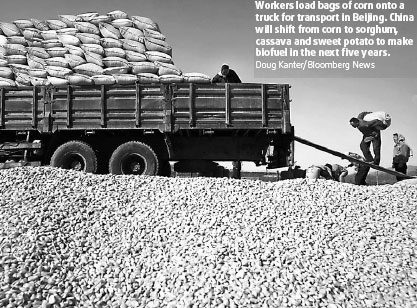Non-staple food on ethanol list
Updated: 2007-09-07 06:31

China will shift from corn to sorghum, cassava and sweet potato plants to make biofuel in the next five years.
The move is part of the government's efforts to develop biofuel without harming the general food supply and security, to ensure a healthy supply of corn both as food and fodder.
Cassava and sweet potato are both high-yield plants, and though edible, they are not used as staple food. So their use as a raw material, as opposed to that of corn, won't create any artificial shortage of food products.
Xiong Bilin, vice-minister of the National Development and Reform Commission's (NDRC) industry department, told China Daily that the conversion of the four major ethanol production centers, which have a combined output of 1 million tons, will be neither too complicated nor costly.
The four centers, along with the newly approved ones, will use the plants of sorghum, cassava and sweet potato that scientists have recommended as corn substitutes.
Among the four ethanol fuel-producing plants, Tianguan Group, based in Central China's Henan Province, the country's major agricultural region, has already shifted 20 percent of its production from corn to cassava. The plant has an annual production of 300,000 tons of ethanol.
The country's efforts to fight global warming will soon get another boost with the largest ethanol production facility getting the green light, said Xiong.
The facility in Hengshui in Hebei Province is expected to yield 300,000 tons of biofuel, mainly from sweet potato, every year.
The authorities are also likely to approve another ethanol-making facility. The unit in Jingmen, Hubei Province, can make 200,000 tons of ethanol from sweet potato plants each year.
China National Cereals, Oils and Foodstuffs (COFCO) will be the major investor not just in the two projects, but in most of the country's ethanol production. Yu Xubo, president of COFCO, said the group plans to focus on cassava.
It also invested in a factory based in South China's Guangxi Zhuang Autonomous Region, the country's top cassava grower, with an annual production of 8 million tons. Its annual ethanol production goal has been set at 200,000 tons.
China wants to increase its ethanol production from 1 million tons a year to 2 million tons in 2010, and 10 million tons by 2020. "Meeting the 2010 target should not be a problem," Xiong said.
Given the rising prices of corn and the threat to food security, the State Council, the country's Cabinet, ordered the biofuel industry to shift from food to non-food material in mid-June.
Xiong, however, stressed that irrespective of the raw material used, the country will continue its shift from fossil fuels to ethanol to save energy and fight climate change.
Gas and diesel sold in nine provinces is already mixed with 10 percent ethanol. Which means the country's dependence on fossil fuels dropped by 1.3 million tons last year.
But the nationwide demand for fuel is more than 50 million tons a year. So a lot more ethanol has to be made if ethanol is to be mixed with fuel throughout the country.
"The country will gradually replace petroleum with ethanol as the main fuel for its chemical industry," Xiong said.
The government is considering offering a 5 percent tax rebate to ethanol producers and some financial subsidies both to producers and suppliers. For producers, it is estimated the subsidy will be more than 1,000 yuan for every ton of their product.
Shi Yuanchun, a member of the Chinese Academy of Sciences, said China is rich in new sources for biofuel.
The country is the world's biggest batata grower, with 7 million hectares and an annual production of 150 million tons, accounting for 80 percent of the global output. Each hectare can yield about 20 tons of dry batata, which can be converted into 3 to 5 tons of ethanol.
(China Daily 09/07/2007 page43)
|
|
|
||
|
||
|
|
|
|